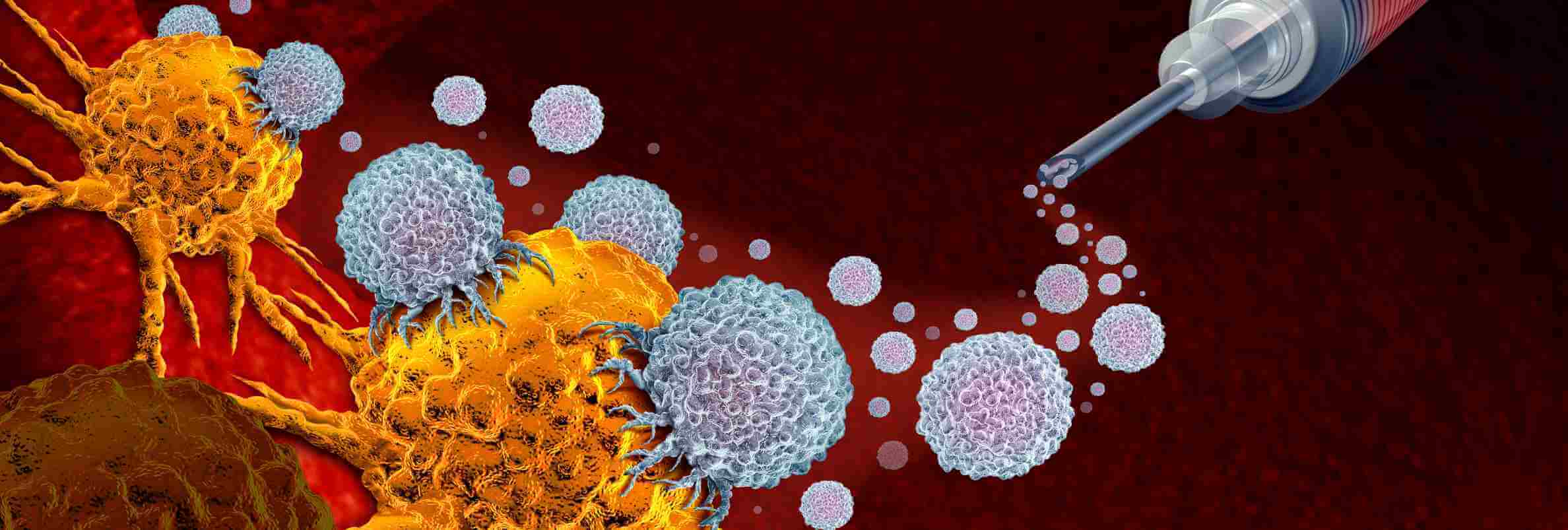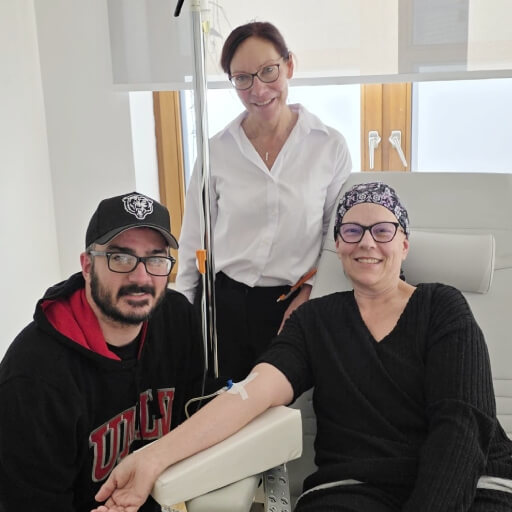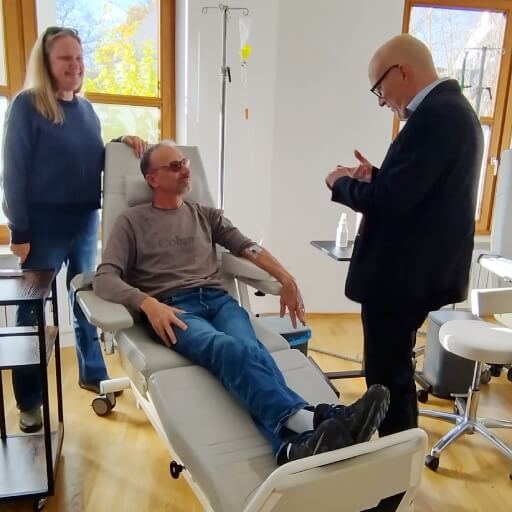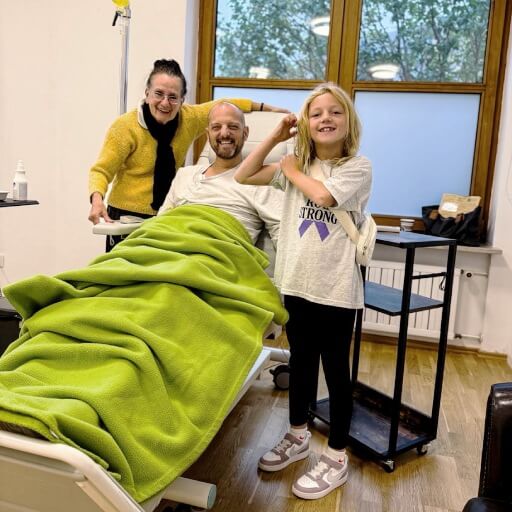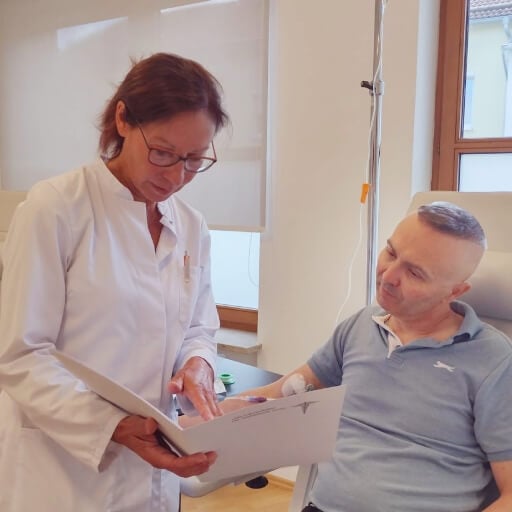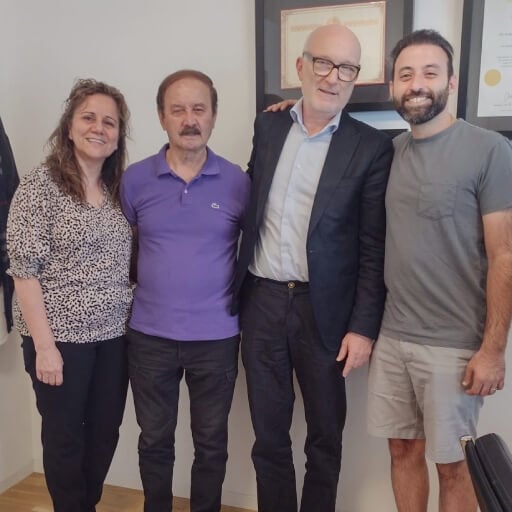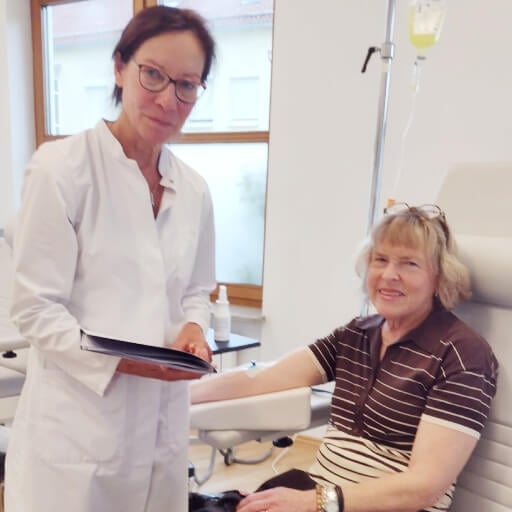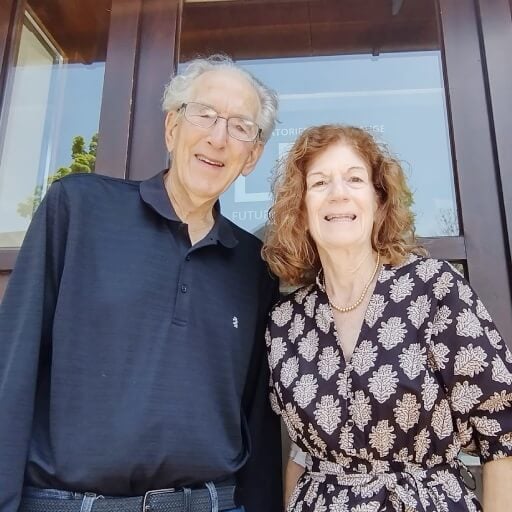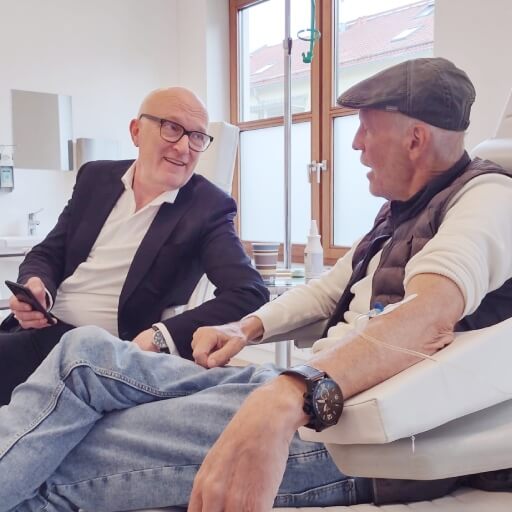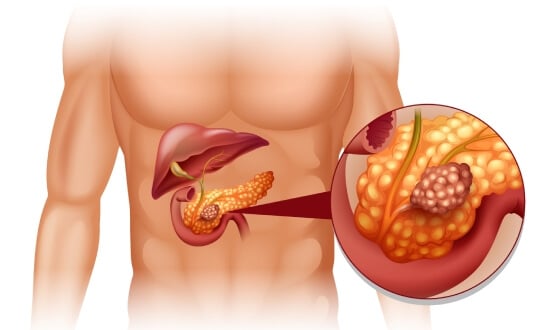Pancreatic cancer is one of the most aggressive types of cancer, with a survival rate of only 13% due to late diagnoses and ineffective response to traditional methods of treatment, including chemotherapy and radiation therapy [1]. Pancreatic cancer is infamous for its resistance to conventional cancer treatment, fast development, and early metastasis.
Nevertheless, there is some light at the end of the tunnel with the recent development of dendritic cell-based immunotherapy against pancreatic cancer, particularly in countries such as Germany, where contemporary clinics are now using the immunotherapy method to manage pancreatic cancer. Through the strength of the immune system, this new cancer immunotherapy helps activate immune cells (especially T-cells), engaging them to specifically identify and kill pancreatic cancer cells.
Dendritic cell therapy is turning out to be an attractive solution in the world of pancreatic adenocarcinoma as clinical experience increases, promising to offer new insights for patients with pancreatic cancer and to redefine the possibilities of treating pancreatic cancer through the activation of natural immune responses.
Understanding Pancreatic Cancer and Why It Is Difficult to Treat
Scientists refer to pancreatic ductal adenocarcinoma (PDAC) as the most common type of pancreatic cancer that constitutes over 90% of all tumors of this organ [2]. Pancreatic adenocarcinoma has been known for causing quick progression of the cancer, early spreading of the cancer, and insidious onset, and this is the reason why most patients with pancreatic cancer are diagnosed in very advanced stages when only innovative therapy can be administered [3, 4].
Pancreatic cancer is not the easiest malignancy to treat due to a number of reasons:
- Massive stroma: The fibrotic tissue surrounding pancreatic cancer cells forms a mechanical barrier that blocks the drug delivery process
- Immunosuppressive microenvironment: Pancreatic ductal adenocarcinoma, in contrast to certain other malignancies, induces the development of an immunosuppressive microenvironment, leading to the inhibition of proper immune functioning and suppression of the immunoblast response, which prevents the immune system from detecting and attacking tumor cells
- Resistance to standard therapy: As it has been stated above, traditional methods, including chemotherapy and radiotherapy, cannot be used to provide long-term control. Recurrence rates are high with the use of even the aggressive regimens, and advanced pancreatic cancer is often found to be refractory to subsequent treatment
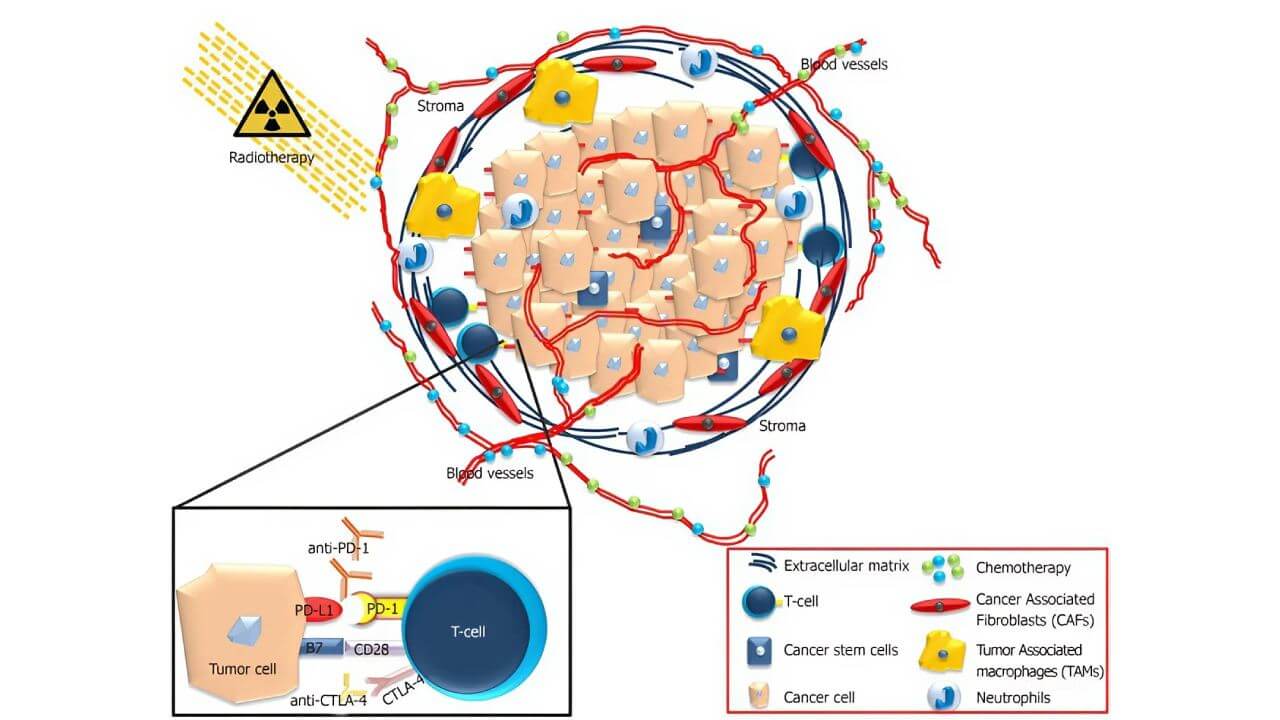
Moreover, pancreatic cancer cells are genetically diverse - therefore, they become less amenable to one-size-fits-all therapy. Consequently, alternative treatment approaches, especially those that reinitiate the immune system by immunotherapy for pancreatic cancer, are needed to enhance the results of pancreatic cancer treatment.
How Dendritic Cell Therapy Works Against Pancreatic Cancer
Dendritic cell therapy for pancreatic cancer is a novel type of cancer immunotherapy that enables the body’s immune system to identify and destroy cancer cells. This immunotherapy uses dendritic cells, which were discovered by Canadian immunologist Ralph Steinman, who was awarded the Nobel Prize in Physiology or Medicine [5].
Dendritic cells are major mediators of specific immune reactions. They take antigens from pancreatic cancer and present them to T-cells, which then recognize and kill tumor cells - even the most difficult-to-target ones. This therapy allows the immune system to eliminate cancer cells more effectively and reduce the damage to healthy tissues by generating cytotoxic lymphocytes that attack these malignant cells.
Unfortunately, pancreatic adenocarcinoma is the most stubborn cancer type with respect to immunotherapy. Its immunosuppressive microenvironment and thick stroma form an opaque barrier, resulting in abnormally low concentrations of active dendritic cells. Research has also demonstrated that pancreatic cancer tumors can harbor up to 80 times fewer dendritic cells than other responsive cancers, such as lung or gastric cancer. The available dendritic cells are also underdeveloped and incapable of activating T-cells [4]
To overcome this barrier, dendritic cell immunotherapy for pancreatic cancer uses a patient’s own monocytes to create laboratory-cultured dendritic cells. These cells are then "trained" using pancreatic cancer antigens derived from pancreatic cancer cells and reintroduced into the body as a therapeutic cancer vaccine. This personalized approach helps boost the natural immune response against pancreatic cancer cells, providing patients with a new and promising strategy to fight advanced pancreatic cancer.
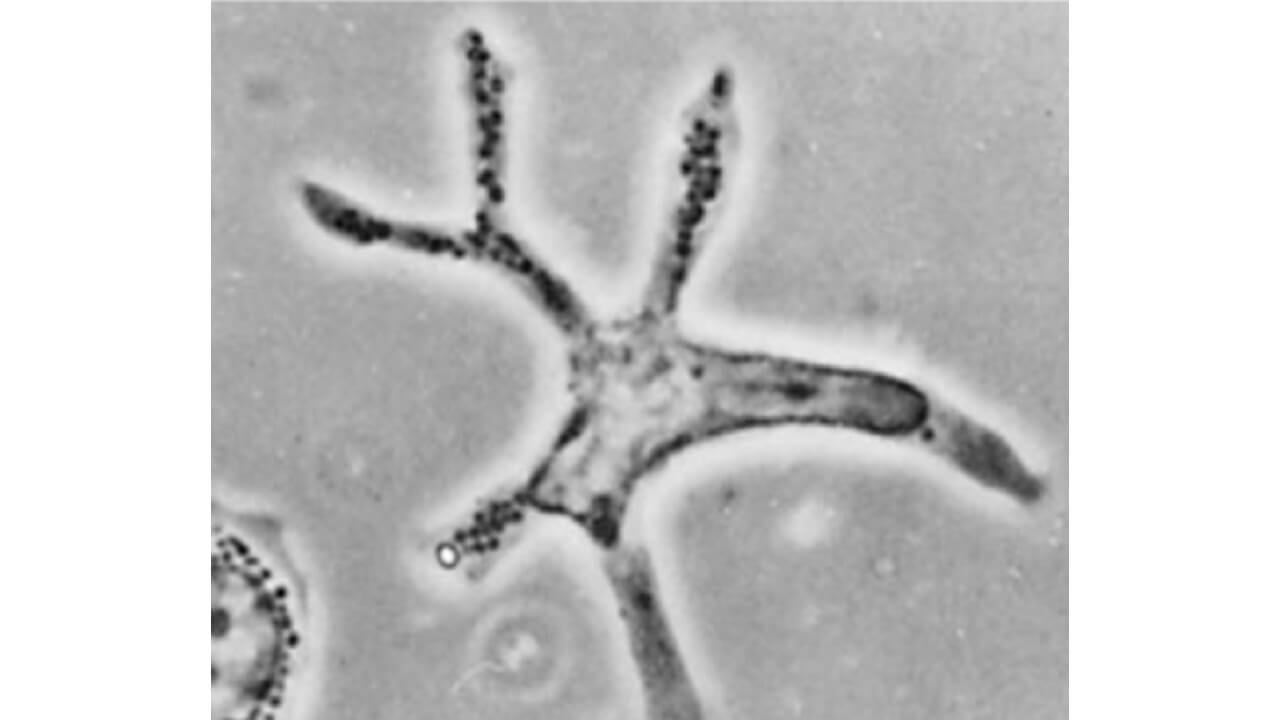
The dendritic cell vaccine:
- Educates T-cells to recognize and destroy pancreatic cancer cells
- Stimulates a tumor-specific immune response
- Enhances the immunogenicity of resistant tumor cells
- Functions as a low-toxicity, highly targeted cancer treatment
Clinical Evidence and Success Rates in Pancreatic Cancer
Despite the historically poor outcomes associated with pancreatic ductal adenocarcinoma, recent clinical trials have demonstrated that dendritic cell vaccination offers significant benefits for metastatic pancreatic cancer. These studies show that treatment-induced immune responses can significantly prolong survival - even in patients with advanced stages and those with metastatic disease.
LANEX-DC® Trial – Germany
A retrospective study evaluated LANEX-DC® dendritic cell therapy in 16 patients with gastrointestinal cancer (gastric cancer and pancreatic cancer), treated after surgical resection [6]. Results showed:
- 5-year disease-free survival (DFS): 62.5%
- 5-year overall survival (OS): 67.5%
- No serious side effects reported
- Some recurrences occurred after 7 years, indicating long-term immune memory
The therapy was well tolerated, reinforcing the dendritic cell vaccine as a safe approach in adjuvant therapy for patients with pancreatic cancer.
REACtiVe Trial – Netherlands
This phase I study explored the safety and efficacy of allogeneic tumor lysate-loaded dendritic cells in resected pancreatic cancer patients [7]. Main results:
- All patients developed activated PD-1+ and Ki67+ T cells
- Immune responses were confirmed in blood, skin, and tumor tissue
- 7 out of 10 patients remained recurrence-free at 25 months (median follow-up)
- No serious vaccine-related adverse events
These findings underscore the dendritic cell vaccine’s potential to generate durable immune responses and delay recurrence in pancreatic cancer patients.
DC-CIK + S-1 Chemotherapy Study – Asia
In patients with advanced pancreatic cancer, a combination of dendritic cells, cytokine-induced killer (CIK) cells, and S-1 chemotherapy showed [8]:
- Median overall survival: 212 days
- Progression-free survival: 136 days
- Improved immune function (e.g., CD4+, CD8+/CD28+ T-cell subsets)
- Reduced tumor cell DNA in the bloodstream
- No grade 3–4 toxicities observed
These results demonstrate that treatment of advanced pancreatic cancer with dendritic cells can extend life, enhance immune responses, and provide hope for patients with pancreatic cancer who face limited options.
How Dendritic Cell Therapy Is Performed in Pancreatic Cancer
Dendritic cell therapy is a form of treatment that is highly customized in the treatment of pancreatic cancer, and it involves the use of the immune system of the patient to attack cancer cells. In contrast to traditional treatments, which are systemic and usually damage normal tissues, the therapy is based on the use of autologous cells to produce a specific immune response. All processes occur in sterile and GMP-approved laboratories with safety and reproducibility being ensured without breaking the strict rules of regulation.
Step 1: Blood Collection and Cell Isolation
The treatment commences by taking about 200 ml of blood from the patient who has pancreatic cancer. Different categories of immune cells such as monocytes that form the precursors of dendritic cells can be found in this sample. The blood is processed under rigidly controlled circumstances to maintain cells in their optimal condition. Centrifugation separates the components of the blood: red blood cells, granulocytes (nonspecific immune cells), and a lymphocyte-rich portion is isolated. This fraction contains the patient-specific cells that will undergo the process of generating the mature dendritic cells that will subsequently be trained to identify the cells of pancreatic cancer.
Step 2: Culturing and priming of Antigens
The separated precursor cells are placed in culture enriched in nutrients and certain growth factors that support their survival and proliferation. Autologous tumor antigens that have been isolated from the plasma or tumor tissue of the patient are now added to prime the cultured cells. This has the effect of training the dendritic cells to present the tumor specific markers to T-cells. These cells are now matured over a period of 7 days by means of the addition of growth factors that induce them to take the characteristic dendritic morphology, increased surface area and enhanced capacity to communicate with immune cells. They are carefully studied as to morphology, viability and functional competence during this period to ensure that the desired immune response will be obtained.
Step 3: Quality Control and Preparation of Vaccines
Rigorous quality control is done on day seven of the culture. Flow cytometry is employed to establish the existence of important surface markers, the total number of cells, and overall viability. Only the cells of high specifications are made ready for administration. The resulting dendritic cells are then loaded into syringe as a personalized cancer vaccine, which is prepared to be reintroduced into the patient. Through this planning, every patient is guaranteed a good therapeutic product of high quality that can activate their immune system without unnecessary toxicity.
Step 4: Administration and Recovery
The dendritic cell vaccine is injected directly under the skin, either in the groin or the upper arms, where the dendritic cells are able to communicate with the immune system of the body. After the injection, supportive treatments are often provided to enhance its effectiveness and recovery of the immune function of the patient. Most patients can return home the same. Once administered, the dendritic cells present tumor antigens to T-cells so that they are aware of the tumor cells and are able to destroy them. This expands the immune response as well as showing to have great specificity in the treatment of patients with advanced pancreatic cancer with a better long term survival.
Clinical and Biological Significance
Dendritic cell therapy is an example of the level of accuracy and customization that can be provided in immunotherapy for pancreatic cancer. The therapy aims to minimize systemic side effects by utilizing the cells of the patient and individual tumor antigens, coordinating the immune response. The protocol is especially useful for patients with pancreatic cancer who sometimes lack helpful alternatives because of tumor location, dense stroma, or resistance to chemotherapy and radiation. Additionally, this practice helps in the formation of immune memory, allowing the patient’s immune system to find the cancer cells in the pancreas and destroy them months or years after treatment.
Benefits Over Chemotherapy and Combination Therapy for Pancreatic Cancer
Although conventional chemotherapy continues to be one of the most widespread first-line treatment options in pancreatic cancer, it is mostly constrained by adverse effects, resistance, and damage to healthy tissue. Conversely, dendritic cell vaccines are a treatment with low toxicity that involves the direct interaction of the immune system and boosts immune reactions without attacking normal cells.
Distinctions to Chemotherapy:
- Activation of the immune system against specific targets vs. non-specific cytotoxic activation
- Little side effects compared to nausea, fatigue, and immune suppression
- Specific immunity against cancer and local tumor immunity
- Repeatable and has non-cumulative toxicity with other treatments used in the treatment of pancreatic cancer
This makes dendritic cell therapy a very attractive alternative to conventional chemotherapy for patients with advanced pancreatic cancer who cannot tolerate more aggressive systemic therapies, or for individuals who prefer less harmful therapy with long-term benefits.
Advantages of Combination and Integrative Cancer Care
- Multimodal oncology
- Enhanced tumor detection and tumor cell destruction
- Enhanced immune reactions and decreased relapses
- Fits in with integrative cancer care models (e.g., nutritional and lifestyle support)
Therefore, dendritic cell vaccination can be used not only independently but also in combination therapy, which aligns with modern, patient-centered approaches in pancreatic cancer treatment and gives hope to patients with pancreatic cancer.
Radiation Therapy and Immunostimulation for Pancreatic Cancer
Traditionally, radiation therapy has shown limited effectiveness in treating pancreatic cancer tumors due to the disease’s immunosuppressive microenvironment. Although radiation damages tumor cells, it often fails to trigger a strong enough response from the immune system to prevent recurrence.
Nonetheless, with current developments in the field of cancer immunotherapy, this is no longer the case, as discussed earlier. Radiation can be used as an immune activator when combined with dendritic cell therapy. When radiation destroys cancer cells in the pancreas, the tumor antigens are introduced into the blood—and this is where dendritic cells come in.
How the combination works:
- Radiation treatment causes immunogenic cell death and antigen release
- Dendritic cells take these antigens and present them to T-cells
- This causes systemic activation of the immune system, not just local tumor control
- It improves the efficacy of radiation with a decrease in collateral damage
This method transforms radiation as a localized treatment into an impulse for whole-body cancer treatment, producing enhanced results even in otherwise incurable pancreatic adenocarcinoma.
Professor Frank Gansauge on the Potential of Dendritic Cells for Pancreatic Cancer Treatment
One of the most respected experts in dendritic cell-based cancer immunotherapy is Professor Frank Gansauge, founder of LDG Laboratories in Berg, Germany. A surgeon by education but an immunologist at heart, Prof. Dr. Gansauge has been among the leaders of dendritic cell therapy for over two decades, helping shape what is now one of the most innovative approaches in pancreatic cancer treatment and beyond.
"I call dendritic cells the 'officers' of the immune system," he explains. "They train the immune cells – the effector T-cells – to recognize and eliminate cancer cells."
One of the earliest in Europe to use EU GMP standards on autologous dendritic cell therapy was Prof. Dr. Gansauge, as early as 2001. His focus is on a patient-centered approach, which involves incorporating conventional methods of treating a patient, such as chemotherapy and radiation therapy, along with individualized treatment through immunotherapy in a home-like environment.
His team has invented the LANEX-DC protocol, which has proven to decrease relapse rates in gastrointestinal cancers, such as gastric cancer and pancreatic cancer, and also increase life expectancy, at least in some cases, achieving complete tumor remission. As part of integrative cancer therapy, he often recommends a single, fresh cancer vaccine rather than repeated injections, explaining that one dendritic cell can train multiple lymphocytes and that patient-specific antigens may evolve over time.
"We aim not only to restore physical health but also a patient's mental well-being."
Another area that Prof. Dr. Gansauge finds exciting is anti-aging medicine, where patients report that they look younger and feel more vital after undergoing immunotherapy for pancreatic cancer yearly.
To learn more about the philosophy of Prof. Dr. Gansauge, his clinical experience, and the science of dendritic cell therapy, we strongly suggest watching his entire interview. In this discourse, he describes the mechanism of action of the dendritic cells, the process of therapy, the reason some cases of pancreatic cancer patients have long-term remission, and how this form of treatment has been extended to other fields, such as the treatment of chronic infections and research on longevity.
Prof. Dr. Frank Gansauge on Dendritic Cell Therapy
Leading Clinics for Dendritic Cell Therapy for Pancreatic Cancer in Germany
Germany provides access to some of the world's most advanced immunotherapy for pancreatic cancer, offering personalized care for patients with pancreatic cancer and other hard-to-treat malignancies. These specialized hospitals are known for combining innovative techniques with high safety standards and international treatment protocols.
Top German cancer centers offering dendritic cell therapy:
LDG – Laboratories Dr. Gansauge (Berg)
- Over 22 years of experience in dendritic cell therapy
- Developer of the LANEX-DC® protocol
- Focus on various cancers, including pancreatic cancer
IOZK – Immuno-Oncology Center (Cologne)
- Leaders in integrative cancer immunotherapy
- Offers personalized cancer vaccine programs and oncolytic virotherapy
- Works closely with international patients with pancreatic cancer seeking treatment in Germany
Praxisgemeinschaft für Zelltherapie (Duderstadt)
- Tailored approaches using a range of cell-based therapies
- Known for compassionate, multidisciplinary care
- Focuses on clinical safety and patient-specific protocols
These German cancer centers represent the most advanced field of cancer therapy, offering innovative options to patients with pancreatic cancer seeking effective, science-supported alternatives to conventional treatment.
Cost of Pancreatic Cancer Treatment and What to Expect
Immunotherapy of pancreatic cancer in Germany for patients with advanced pancreatic cancer normally costs between 20,000 and 38,000 EUR, depending on the clinic, type of procedure, as well as whether the treatment is combined with other pancreatic cancer therapies.
The length of stay of patients suffering from pancreatic cancer varies based on the type of cancer and the treatment applied to them. Therefore, a time span of 7 to 14 days is considered sufficient to include medical check-ups, blood tests, vaccine preparation, and administration of the final cancer therapy. A majority of the clinics also include after-treatment follow-up and nutritional support, which guarantees maximum immune functioning and control of immune responses.
Although the cost of treatment can differ, treatment of pancreatic cancer patients is highly specialized, with advanced laboratories and standards of safety acknowledged worldwide, all offered within the context of the German medical system of high standards. This multifaceted strategy improves the efficacy of cancer immunotherapy, as well as the immune response, to eliminate tumor cells and treat advanced pancreatic cancer.
Pancreatic Cancer Patient Experience: Robert Franklin Smith
Robert Franklin Smith was diagnosed with advanced pancreatic cancer, which had spread to the liver. He went through surgery and chemotherapy in the United States and then went to foreign countries to explore other options.
Booking Health enabled his family to learn about pancreatic cancer treatment in Germany and connect with LDG Laboratories, where he underwent dendritic cell-based immunotherapy against pancreatic cancer under the supervision of leading experts. His wife said that it was a life-changing experience, not only because of the treatment itself but also due to the kindness and professionalism of the entire medical staff.
She emphasized the seamless organization, effective communication, and the comfort the process provided. To Robert, the treatment offered not only a medical option but also restored hope, a stronger immune system, and quality time with his family, which demonstrates the tangible effect of cancer immunotherapy on patients with advanced pancreatic cancer.
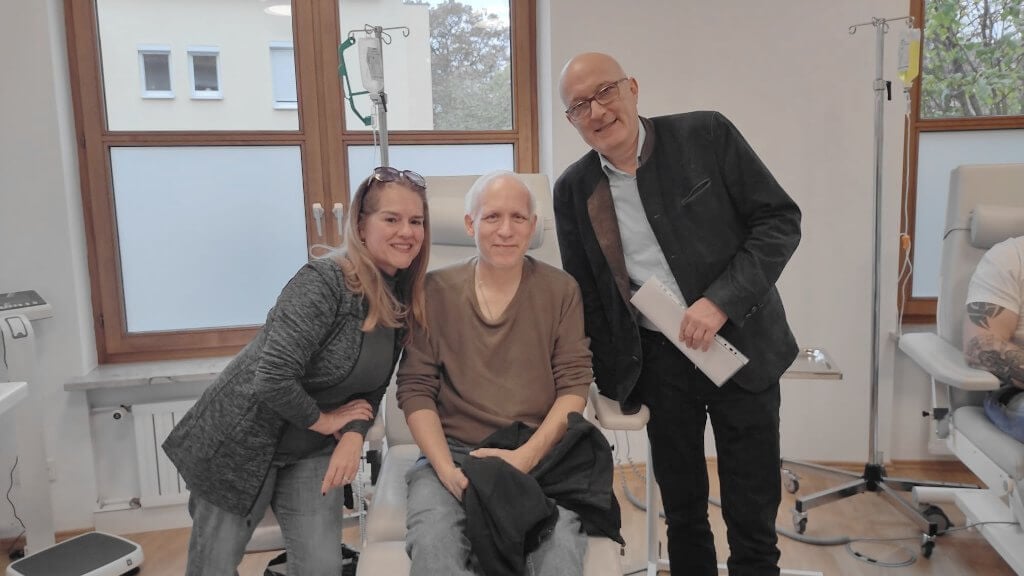
Step-by-Step Guide to Getting Pancreatic Cancer Treatment in Germany
Accessing cancer treatment in Germany is straightforward with Booking Health services, which provide full medical travel support from initial contact to follow-up care. Here is how the process works:
Step-by-step:
- Submit your medical documents – Diagnosis, recent lab tests, and imaging
- Receive expert evaluation – German specialists review your case and assess eligibility for dendritic cell therapy
- Get a customized treatment plan – Including cost estimate, timeline, and clinic recommendation
- Book your treatment – Patient coordination includes visa help, accommodation, and interpreter services
- Begin treatment in Germany – Blood is collected, the vaccine is prepared, and administered within 1-2 weeks
- Receive follow-up care plan – Stay connected with your care team remotely after returning home
A Medical Journey: Every Step of the Way With Booking Health
Finding the best treatment strategy for your clinical situation is a challenging task. Being already exhausted from multiple treatment sessions, having consulted numerous specialists, and having tried various therapeutic interventions, you may be lost in all the information given by the doctors. In such a situation, it is easy to choose a first-hand option or to follow standardized therapeutic protocols with a long list of adverse effects instead of selecting highly specialized innovative treatment options.
To make an informed choice and get a personalized cancer management plan, which will be tailored to your specific clinical situation, consult medical experts at Booking Health. Being at the forefront of offering the latest medical innovations for already 12 years, Booking Health possesses solid expertise in creating complex management programs in each individual case. As a reputable company, Booking Health offers personalized treatment plans with direct clinic booking and full support at every stage, from organizational processes to assistance during treatment. We provide:
- Assessment and analysis of medical reports
- Development of the medical care program
- Selection of a suitable treatment location
- Preparation of medical documents and forwarding to a suitable clinic
- Preparatory consultations with clinicians for the development of medical care programs
- Expert advice during the hospital stay
- Follow-up care after the patient returns to their native country after completing the medical care program
- Taking care of formalities as part of the preparation for the medical care program
- Coordination and organization of the patient's stay in a foreign country
- Assistance with visas and tickets
- A personal coordinator and interpreter with 24/7 support
- Transparent budgeting with no hidden costs
Health is an invaluable aspect of our lives. Delegating management of something so fragile yet precious should be done only to experts with proven experience and a reputation. Booking Health is a trustworthy partner who assists you in pursuing stronger health and a better quality of life. Contact our medical consultant to learn more about the possibilities of personalized treatment with innovative methods and with leading specialists in this field.
Personalized Dendritic Cell Treatment: Experience with Booking Health
Frequently Asked Questions About Dendritic Cell-Based Immunotherapy In Pancreatic Cancer
Send request for treatmentThis is a special kind of therapy aimed at the use of dendritic cells. Their main function is to stimulate the immune response against cancer cells.
Dendritic cell therapy offers the patient an individualised and selective treatment, the aim of which is to stimulate their immune system.
The success rate will vary according to the clinical conditions (patient-specific), as well as the stage of the disease. Clinical trials have confirmed the good results obtained by some patients who have experienced a significant reduction of the tumor in the pancreas and life expectancy has also increased appreciably.
The side effects of dendritic cell therapy are usually mild and (low-grade fever and nausea). Serious complications are rare and require monitoring.
How can patients gain access to dendritic cell-based immunotherapy for pancreatic cancer in Germany?
This therapy is accessible via special clinics and medical centers in Germany. Booking Health can help with the whole process involving medical consultations, travel arrangements, as well as suite treatment.
The cost of dendritic cell therapy for pancreatic cancer in Germany is between €17,000 and €38,000, depending on the diagnostic tests performed, production of the individualized vaccine and its administration.
Dendritic cell therapy is a type of immunotherapy. It utilizes the individual’s immune cells to recognize and attack tumors in the body. Dendritic cells stimulate the immune system to mount a specific immune response by inducing the recognition of tumor antigens by T-cells.
Yes. Clinical studies have demonstrated that dendritic cells therapy prolongs survival and improves quality of life in patients with stage 4 pancreatic cancer.
Dendritic cells are produced from blood cells in a patient’s blood. They are incubated in the lab and given appropriate antigens. The result is a vaccine that enables the individual's immunity to be activated.
The most significant advantage of dendritic cell therapy over chemotherapeutic agents is that the side effects of dendritic cells are minimal. The dendritic cells selectively attack cancer cells but leave normal healthy cells unaffected.
Yes. The combination of dendritic cell therapy with other types of treatment (for example, targeted therapy) is recommended in certain cases and actively employed in Germany.
Dendritic cell therapy is offered in leading German cancer centers including LDG Laboratories, Iozk in Cologne and Zelltherapie Duderstadt.
When utilizing the service of Booking Health, full medical travel can be arranged, including specialist consultation, selection of clinics, visa arrangement, and coordination of patients in Germany.
In Germany pancreatic cancer patients can receive dendritic cell therapy only after detailed assessment. Treatments are personalized and administered under close supervision. Also they are combined with standard oncology care to enhance immune response.
Choose treatment abroad and you will for sure get the best results!
Authors:
This article was edited by medical experts, board-certified doctors Dr. Nadezhda Ivanisova, and Dr. Bohdan Mykhalniuk. For the treatment of the conditions referred to in the article, you must consult a doctor; the information in the article is not intended for self-medication!
Our editorial policy, which details our commitment to accuracy and transparency, is available here. Click this link to review our policies.
Sources:
[1] American Cancer Society. Survival Rates for Pancreatic Cancer. https://www.cancer.org/cancer/types/pancreatic-cancer/detection-diagnosis-staging/survival-rates.html
[2] World Journal of Gastrointestinal Oncology. Pancreatic Ductal Adenocarcinoma: Treatment Hurdles, Tumor Microenvironment and Immunotherapy. https://www.wjgnet.com/1948-5204/full/v12/i2/173.htm?appgw_azwaf_jsc=78gdQkpXR5RkRS6CBpoX2cib01f3KjsnU7uHE2a70Rs
[3] Aleksandra Adamska, Alice Domenichini, Marco Falasca. Pancreatic Ductal Adenocarcinoma: Current and Evolving Therapies. Int J Mol Sci. 2017 Jun 22;18(7):1338. doi: 10.3390/ijms18071338. [DOI] [PMC free article]
[4] Anton Deicher, Roland Andersso, Bobby Tingstedt et al. Targeting dendritic cells in pancreatic ductal adenocarcinoma. Cancer Cell Int. 2018 Jun 18;18:85. doi: 10.1186/s12935-018-0585-0. [DOI] [PMC free article]
[5] Journal of Experimental Medicine. Kicking off Adaptive Immunity: The Discovery of Dendritic Cells. https://rupress.org/jem/article/203/7/1622/46400/Kicking-off-adaptive-immunity-the-discovery-of
[7] European Journal of Cancer. Autologous Dendritic Cells Pulsed with Allogeneic Tumour Cell Lysate Induce Tumour-Reactive T-Cell Responses in Patients with Pancreatic Cancer: A Phase I Study. https://www.ejcancer.com/article/S0959-8049(22)00159-9/fulltext
[8] Clinical Cancer Research. Dendritic Cell/Cytokine-Induced Killer Cell Immunotherapy Combined with S-1 in Patients with Advanced Pancreatic Cancer: A Prospective Study. https://aacrjournals.org/clincancerres/article/23/17/5066/122902/Dendritic-Cell-Cytokine-Induced-Killer-Cell
Read:
Pancreatic Cancer Treatment: Guideline for Treatment Options
Article menu:
- Understanding Pancreatic Cancer and Why It Is Difficult to Treat
- How Dendritic Cell Therapy Works Against Pancreatic Cancer
- Clinical Evidence and Success Rates in Pancreatic Cancer
- How Dendritic Cell Therapy Is Performed in Pancreatic Cancer
- Benefits Over Chemotherapy and Combination Therapy for Pancreatic Cancer
- Radiation Therapy and Immunostimulation for Pancreatic Cancer
- Professor Frank Gansauge on the Potential of Dendritic Cells for Pancreatic Cancer Treatment
- Leading Clinics for Dendritic Cell Therapy for Pancreatic Cancer in Germany
- Cost of Pancreatic Cancer Treatment and What to Expect
- Pancreatic Cancer Patient Experience: Robert Franklin Smith
- Step-by-Step Guide to Getting Pancreatic Cancer Treatment in Germany
- A Medical Journey: Every Step of the Way With Booking Health
- Frequently Asked Questions About Dendritic Cell-Based Immunotherapy In Pancreatic Cancer
Don't know where to start?
Contact Booking Health